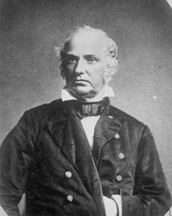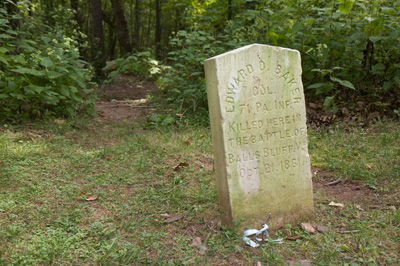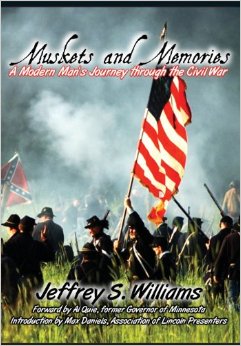Edward Baker was born in London, England. his family moved to the United States in 1815, and Baker spent the next ten years of his life in Philadelphia before his family moved to Indiana and then Illinois. While still a teenager, Baker studied law and was admitted to the Illinois bar at the age of nineteen. At twenty-four, Baker moved to Springfield, Illinois, where he became over the next seventeen years a prominent attorney and political figure. During his time in Springfield, Baker became close friends with another rising young lawyer, Abraham Lincoln. Abraham and Mary Lincoln named their second son after their close friend Baker.
In his early political life, Baker was a Whig, although he did not always follow the party line. At the age of twenty-six, Baker entered the Illinois legislature and served two terms in the lower house before moving to the state senate in 1840. In 1844 he defeated his good friend Lincoln for the district’s Whig nomination to the U.S. House of Representatives and won the election. While in the House beginning in 1845, Baker broke party ranks by supporting the expansionist policies of President James K. Polk.
At the outbreak of the Mexican-American War, Baker traveled from Washington to Illinois to raise a regiment. he became colonel of the regiment and took it to serve under Zachary Taylor in northern Mexico. Baker returned briefly to Congress at the end of 1846 and, wearing his uniform, urged the Congress to vote more funds for the maintenance of soldiers at the front.
Shortly after the beginning of 1847, Baker resigned his congressional seat and joined Winfield Scott’s Mexico City campaign. From April through September 1847, Baker fought in all the major battles of the war and commanded a brigade at one point.
After the Mexican-American War, Baker returned to Illinois, where he moved to another congressional district and was elected to Congress. In 1851 Baker left Congress and the following year moved to California. Baker’s Whig and then Republican affiliations meant that he would have little political future in heavily Democratic California. He became, however, a popular local attorney in San Francisco and, in spite of his politics, was much in demand as a public speaker.
His political future bleak in California, Baker accepted the invitation of Oregon Republicans to move to that state and run for the U.S. Senate in 1860. Baker did so and won the election. As senator-elect from Oregon and the only Republican senator from the West Coast, Baker made it a personal crusade to encourage those states, particularly California, to stay in the Union. Some people later credited him with saving the heavily Democratic state for the United States.
On his way to Washington after his visit to California, Baker stopped in Springfield to meet with President-elect Lincoln. Over the next several months, Baker made several stirring speeches urging support for the Union. He refused the offer of a brigadier general’s commission because any commission at the general rank would require him to resign his Senate seat. Therefore, when offered the colonelcy of the 71st Pennsylvania (sometimes referred to as the 1st California because of Baker’s ties to the West Coast), he accepted. Throughout the summer of 1861, Baker divided his time between training his regiment and serving in the U.S. Senate.
In August 1861, Baker commanded a brigade along the Potomac, though he remained at the rank of colonel. On 28 September 1861, Baker commanded his brigade at a skirmish near Munson’s Hill, Virginia. A week earlier he had been offered a major general’s commission but was apparently still considering it and had made no reply.
On 21 October, Baker’s commander Brigadier General Charles P. Stone ordered Baker to demonstrate against Confederates across the Potomac near Poolesville. At Balls’ Bluff, without careful reconnaissance, baker moved across the river into a trap. He was killed, and most of his command were killed or captured. he had never replied to the offer of a major general’s commission.
The president deeply mourned the loss of his friend, but the most lasting impact of the debacle was the persecution of Charles Stone. Many blamed stone for the popular Baker’s death. That Stone was a Democrat did not help his cause. He was called before the Committee on the Conduct of the War and eventually arrested without charge. He was imprisoned for 189 days and never held an important command for the remainder of the war.
- David S. Heidler and Jeanne T. Heidler [Source: Heidler and Heidler, Encyclopedia of the American Civil War: A political, social and military history. W.W. Norton & Co. 2002. pp. 161-162.]




Pingback: 150 Years Ago: Battle of Ball’s Bluff Oct. 21, 1861 | thisweekinthecivilwar